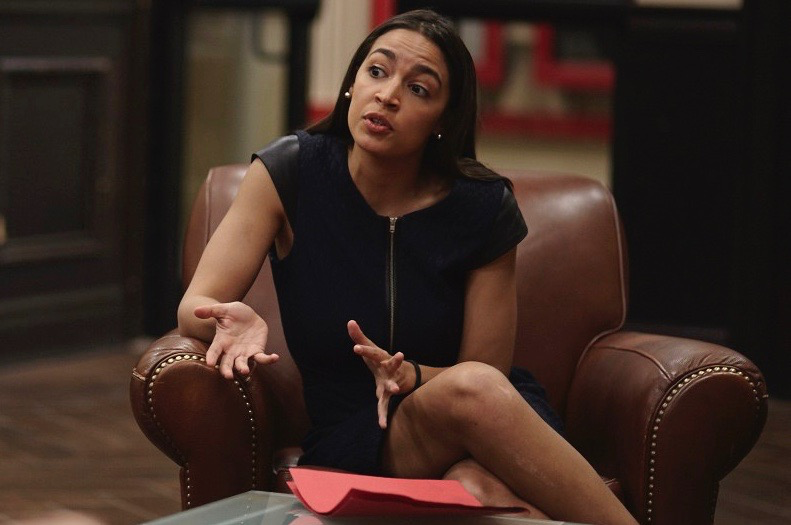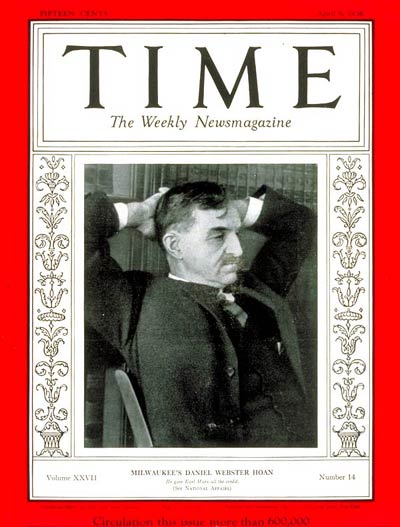 If a political novice like Donald Trump can become president, why not give a political novice, like New York Senate primary winner Alexandria Ocasio-Cortez – with the energy, sharp intellect and vision of youth – a chance to apply her ideas about democratic socialism? We are, after all, a democratic society. Medium
If a political novice like Donald Trump can become president, why not give a political novice, like New York Senate primary winner Alexandria Ocasio-Cortez – with the energy, sharp intellect and vision of youth – a chance to apply her ideas about democratic socialism? We are, after all, a democratic society. Medium
Perhaps the most naked and time-worn example of American “anti-intellectualism” is the demonizing of the word “socialism.” Even some educated and seemingly thoughtful people instinctively react as if even the scent of socialism robs them of their precious liberties.
But the freedom capitalism promises – and now delivers so pathetically to “we the people” – is to empower or enrich persons or corporations in isolation, leaving distribution of wealth up to the enriched.
Yet in the United States, a person is almost invariably part of some community, if they admit it or not. Even a hard-working farmer, living perhaps a mile away from a neighbor, is sorely dependent on an economic system that runs fairly to compensate and support his labors. This means that a socio-economic system that balances the needs of individuals, as opposed to greedy wants, with the needs of the community makes sense. Why? Because trickle-down theories of capitalism rarely actually deliver to the people, whereas a social-minded system strives to assure the individual gets back something from the communal system.
I think a more socialist-oriented America can help redirect appropriate percentages of taxes on the rich, help close the terrible income equality gap, and stimulate the economy with greater consumer-spending power. Democratic socialism can co-exist with our capitalist system, in a dialectical tension, a check and balance, if citizens and our leaders do their jobs.
Bret Stevens, a conservative New York Times opinion columnist, reacted recently with condescending, patriarchal tone to the win of Alexandria Ocasio-Cortez, a 28-year-old newcomer to politics who beat out an old Democratic Party insider, Joseph Crowley, in New York’s senatorial primary, and who has captured the imagination of a lot of America. She’s a self-described “social democrat.”
Stevens then trots out examples of how a few socialist governments in Mexico and South Africa have been corrupted. In Europe, democracies have consistently strengthened or formed since World War II, based on socialist principles. But their current struggles with reactionary politics are due to mainly to massive refugee flight from wars elsewhere. The problem isn’t the democratic socialism of, for example, Germany where, despite her challenges, chancellor Angela Merkel is now, in effect, the leader of the free world, now that President Trump his virtually abdicated such a role, with his anti-allies and pro-dictatorial perversities.
His disgraceful post-Summit press conference performance beside Vladimir Putin in Helsinki on Monday is only the latest (and perhaps the worst) example.
It’s true that any political system can be corrupted. That is why democracy can never be a spectator sport, and part of the people’s role is remain vigilant about keeping our politicians honest. And Mr. Stevens, what about the gross corruptions that capitalism has wrought, time after time after time? We live in one of the worst ever – the reason why American people across much of the political spectrum want meaningful change, not the same old same old. 1
More in America’s societal key, Stevens sings the grindingly tired “left-center-right” song that has not an ounce of intellectual creativity in it:
“If Trump is the new Nixon, the right way to oppose him isn’t to summon the ghost of George McGovern. Try some version of Bill Clinton (minus the grossness) for a change: working-class affect, middle-class politics, upper-class aspirations.”
First of all, Trump is proving far worse than Nixon, who at least had intelligence for political and policy nuance, and a sense of shame. And Nixon actually accomplished some policies that provided ordinary people social and economic benefit, unlike anything Trump has done. And summoning “the ghost of George McGovern” is lamely poking at a straw man.
As for what we should agree on, we do need finally “working-class affect, middle-class politics,” and even “upper-class aspirations.” Those are all things that a well-run government that functions for general societal benefit can provide, with good faith and creative collaboration. You might notice how Stevens’ historical cherry-picking ignores the historic elephant in the room, the most relevant history in modern America. Of course, that’s Franklin Roosevelt’s New Deal, which produced the most successful and extended period of across-the-board prosperity in American history.
As John Nichols points out in his history of American socialism, Roosevelt “drew inspiration from the platforms of the Socialist party that (Eugene) Debs handed off to Norman Thomas. But Roosevelt, a lifelong reader of (Thomas) Paine quoted the pamphleteer’s fireside chats (‘So spoke Americans in the year 1776. So speak Americans today!’) borrowed at least as much from the distant revolutionary’s canon.” 2
We know that when social-minded policy is put on the table, conservatives often start bleating about profligate hand-outs to the needy. However, thinking of American farmers, Thomas Paine wrote in his pamphlet “Agrarian Justice”:
“But it is justice, and not charity, that is the principle of the plan. In all great cases it is necessary to have a principle more universally active than charity; and with respect to justice, it ought not to be left the choice of detached individuals whether they will do justice or not… It ought to be the act of the whole growing spontaneously out of the principles of the revolution, and the reputation of it ought to be national and not individual.” 3
I want to draw an arc from Thomas Paine to the New Deal more pointedly, to one of the most explicitly acclaimed examples of socialist success in American history – in Milwaukee – which Nichols details in his book. But it was a column on this very topic this week by Shepherd Express writer Joel McNally which actually inspired this blog.
The longtime journalist has also taught a class on urban history of Milwaukee at UW-Milwaukee. His column notes the swelling energy and activism begat by Sen. Bernie Sanders’ presidential campaign, and concisely delineates how the three consecutive Socialist mayors of Milwaukee, from 1910 to the 1960s, succeeded.
McNally explains that “there is a reason why young activists don’t consider socialism to be a scary word. They’re well-educated.” McNally then demarcates a history he taught his students, about what he calls “Milwaukee’s Socialist example.” The city’s three socialist mayors over that time were Emile Seidel (1910-1912); Daniel Hoan (1916-1940); and Frank Zeidler (1948-1960). The first, Seidel, helped clean up Mayor David Rose’s corrupt government, and Zeidler lives on as far more than a historical entity to those old enough to have witnessed his successful mayoral terms.
“But it was Hoan – the crusading socialist city attorney left standing after the 1912 purge of socialists who was elected mayor in 1916 and held the office for the next 24 years – who defined lasting contributions of Democratic Socialists to democracy itself,” McNally writes.

Socialist Milwaukee Mayor Daniel Hoan on the cover of TIME magazine in 1936. Courtesy TIME
Daniel Hoan was so successful with a socialist Milwaukee government that he was “recognized nationally for its sound financial management while expanding public employment for those out of work.” The New York Times praised Hoan in December 1931, two years after the stock market crash of 1929, for paying its bills, delivering unemployment relief to hundreds of thousands, “and at the end of the year will have about $ 4 million in the bank.”
And TIME magazine, run by conservative Republican publisher Henry Luce, put Hoan on its cover in April 1936, reporting: “Under him, Milwaukee has become perhaps the best-governed city in the US.”
McNally then describes how, despite The Democratic Party’s successful undermining of The Socialist Party, Democrat Franklin Roosevelt “used public employment, unemployment benefits and other social safety net programs to pull the nation out of the Great Depression and become the most popular president in history.”
Lyndon Johnson’s Medicare and Medicaid, Barack Obama’s Affordable Care Act similarly are socialist programs, McNally notes.
“It’s as American as apple pie to elect a bright, new generation of Democratic Socialists. They’re fighting to preserve the American ideal of sharing the economic benefits of democracy with everyone, not just the wealthy.” 4
And we’re likely better off with more women public servants, like Ocasio-Cortez, baking America’s apple pie, because they’re often more skilled and experienced in the societal kitchen than men, and know how to slice and distribute the pies, to Make America Socially Equitable Again. How great would that America be?
____________
1 Bret Stevens,
“Democratic Socialism is Dem Doom,” https://www.nytimes.com/2018/07/06/opinion/democratic-socialism-alexandria-ocasio-cortez.html, The New York Times, July 6, 2018
2. John Nichols, The “S” Word: A Short History of an American Tradition… Socialism, Verso, 2011, 46
3. Nichols, quoting Thomas Paine in The “S” Word: A Short History of an American Tradition… Socialism, 50
4. Joel McNally, Democratic Socialists Aren’t Demons; They’re Just Energized Democrats, The Shepherd Express, July 12-18, p. 10, 2018


Anther well wrtten article Kevin! Very important words.
Thanks, dear Nancy. Always appreciate your interest, support, and love.